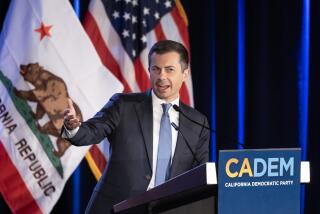It’s Never Too Early for GOP Hopefuls
ONTARIO — A mere 1,313 days before voters go to the polls, Republicans began tryouts this weekend for the 2000 presidential campaign, staging auditions before a convention of California’s most hard-core conservative activists.
With the speakers all chorusing common themes of a balanced budget, less government and greater morality, it was sometimes hard to tell the players apart, even with a program from the California Republican Assembly. But, if nothing else, the early auguries of ambition proved there is no such thing as starting too soon when seeking the White House.
Served up as banquet fare at breakfast, lunch and dinner were Texas Gov. George W. Bush; Sens. Fred Thompson (R-Tenn.) and John Ashcroft (R-Mo.), and publisher Steve Forbes, fresh from his money-to-burn 1996 presidential campaign. It was the first extravaganza of its kind and, as such, a sort of unofficial kickoff for the fight to win the GOP nomination three years hence.
Counting Forbes and the Rev. Pat Robertson, another convention speaker who sought the White House in 1988, delegates heard from two past presidential contenders and an indeterminate number of future ones.
The protocol at this stage of the process requires any and all candidates--or non-candidates, as they prefer to be depicted--to insist that they have no interest whatsoever in stirring speculation about their designs, even when they travel great lengths to inspire just that.
Thus, at a news conference preceding his Friday night appearance, Bush welcomed questions about his presidential prospects as an opportunity to eschew any talk of such ambitions. “There’s inevitable speculation, I understand,” Bush told reporters. “But I’m doing everything I can to keep that speculation down.”
Which, in his case, included leaving Texas in the midst of a legislative battle over his massive tax overhaul plan to speak Friday to an Orange County business group, then address several hundred CRA delegates in a back ballroom of the Red Lion Hotel in Ontario.
But if candor was one of the weekend’s casualties, the convention proved an unqualified triumph for the CRA, an organization that formerly dwelled on the fringes of a none-too-welcoming state Republican Party establishment.
The group is California’s biggest and most important collection of grass-roots GOP activists, many of whom regard the rest of their fellow Republicans as suspiciously soft and shamefully liberal.
The group’s pugnacious bent was illustrated by one of the red, white and blue bumper stickers on sale at the convention: “Dr. Jack Kevorkian for White House Physician,” it read.
In recent years, the group has charted a remarkable rise as the CRA’s brand of combative conservatism has become viewed as less strident and more an accepted norm of political discussion. The organization’s former leaders now control the state GOP--party Chairman Mike Schroeder is an ex-CRA president--and the convention’s heavyweight guest list helped underscore that power shift within the party.
Not that change was necessarily an overarching theme. One after another, the lineup of potential White House aspirants seemed to offer not so much a glimpse of the race to come but a glance back at the campaign just ended.
Whether it was Bush’s invocation of the 10th Amendment granting power to the states, Ashcroft’s attack on the president’s drug policy, Thompson’s questioning of White House fund-raising or Forbes touting his trademark flat tax, many of the themes and a good deal of the rhetoric flowed straight from the 1996 script.
There was notably little mention of the party’s most recent standard-bearer, former Senate Majority Leader Bob Dole. Robertson, in one of the few references, dismissed him Saturday night as “a laconic Kansan with a bad arm” and mimicked Dole’s debilitating World War II injury.
If the whole endeavor seems a bit unfathomable to the average person, no matter.
“This is not intended for real people, who are mowing their lawns or taking kids to Little League practice. This is for insiders,” said Stuart Rothenberg, who publishes the Rothenberg Political Report for just those sorts of campaign junkies. “The purpose is to identify fund-raisers, volunteers and people who can later on organize communities for these candidates.”
And if real people think that 1,300 days before the election seems an indecently early time to start scheming, Rothenberg disagrees.
“Forty years ago this would have been early,” he said. “But in the era of the modern permanent campaign, where fund-raising never stops and candidate appearances are rarely halted except by tornadoes or blizzards, it’s not so unusual. It’s become such a long, drawn-out process, you can almost never be too early.”
More to Read
Get the L.A. Times Politics newsletter
Deeply reported insights into legislation, politics and policy from Sacramento, Washington and beyond. In your inbox three times per week.
You may occasionally receive promotional content from the Los Angeles Times.











